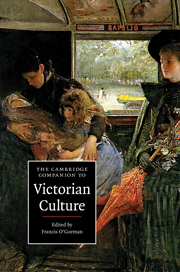15 - Remembering the Victorians
Published online by Cambridge University Press: 28 July 2010
Summary
Introduction
Writing to Virginia Woolf in 1912, Lytton Strachey tried, and failed, to imagine a time when we would love the Victorians, or at least find an acceptable way of condescending to them:
Is it prejudice, do you think, that makes us hate the Victorians, or is it the truth of the case? They seem to me to be a set of mouthing bungling hypocrites; but perhaps really there is a baroque charm about them which will be discovered by our great-great-grandchildren, as we have discovered the charm of Donne, who seemed intolerable to the 18th century. Only I don't believe it[.]
The power of metaphor allows us to think of Matthew Sweet, author of Inventing the Victorians (2001), as Strachey's great-great-grandchild, affirming that
Victorian culture was as rich and difficult and complex and pleasurable as our own; that the Victorians shaped our lives and sensibilities in countless unacknowledged ways; that they are still with us, walking our pavements, drinking in our bars, living in our houses, reading our newspapers, inhabiting our bodies.
The three stages of Sweet's argument take us from equivalence ('as rich and difficult and complex and pleasurable as our own'), through influence ('shaped our lives and sensibilities'), to confluence ('inhabiting our bodies').
- Type
- Chapter
- Information
- The Cambridge Companion to Victorian Culture , pp. 273 - 292Publisher: Cambridge University PressPrint publication year: 2010
- 1
- Cited by



